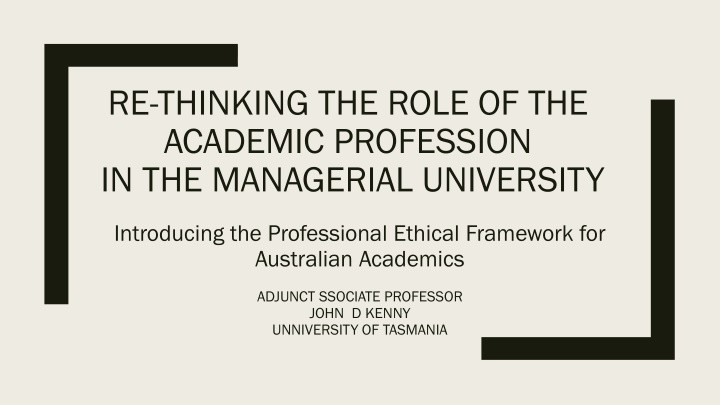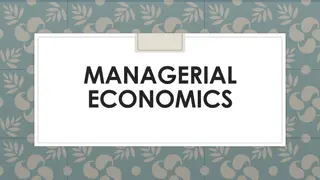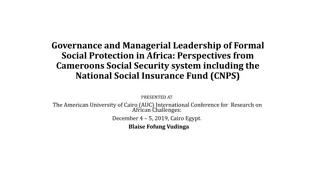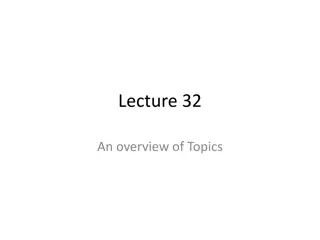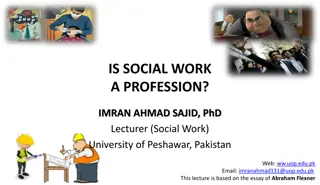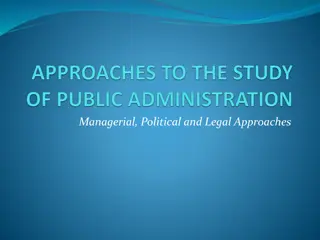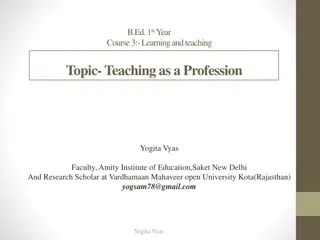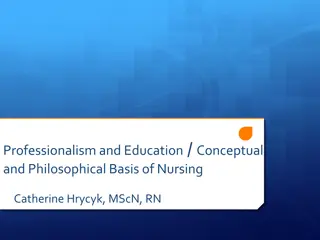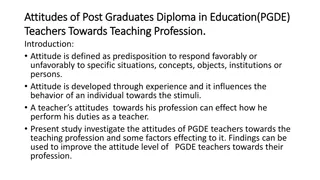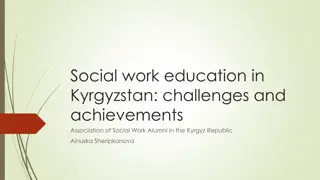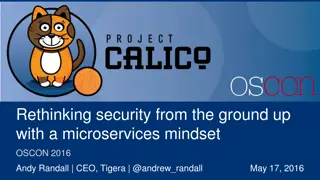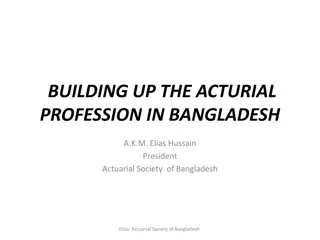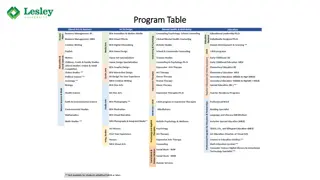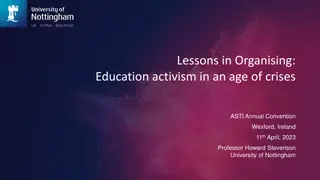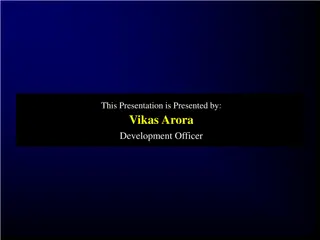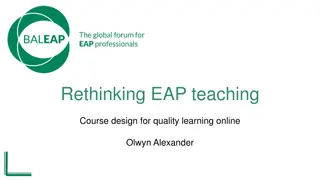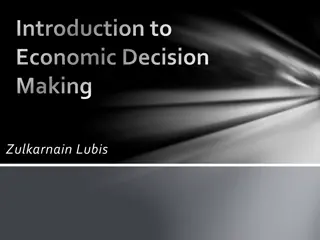Rethinking the Academic Profession in Managerial University
The role of academics in delivering competencies for employment and truth in higher education, explored through efficiency and effectiveness concepts for policy coherence at system, university, and individual levels.
Download Presentation

Please find below an Image/Link to download the presentation.
The content on the website is provided AS IS for your information and personal use only. It may not be sold, licensed, or shared on other websites without obtaining consent from the author.If you encounter any issues during the download, it is possible that the publisher has removed the file from their server.
You are allowed to download the files provided on this website for personal or commercial use, subject to the condition that they are used lawfully. All files are the property of their respective owners.
The content on the website is provided AS IS for your information and personal use only. It may not be sold, licensed, or shared on other websites without obtaining consent from the author.
E N D
Presentation Transcript
RE-THINKING THE ROLE OF THE ACADEMIC PROFESSION IN THE MANAGERIAL UNIVERSITY Introducing the Professional Ethical Framework for Australian Academics ADJUNCT SSOCIATE PROFESSOR JOHN D KENNY UNNIVERSITY OF TASMANIA
The most important question for the future of higher The most important question for the future of higher education seems to be can we trust those who control it to education seems to be can we trust those who control it to deliver anything other than competencies aimed at securing deliver anything other than competencies aimed at securing employment and the fluidity in what is taken as truth? employment and the fluidity in what is taken as truth? (Gibbs, 2019, p. 508) (Gibbs, 2019, p. 508)
Central concepts used Efficiency Efficiency refers to how well an activity or operation is performed. i.e. doing same or more with less.. Effectiveness Effectiveness relates to performance of the correct activity. It raises value questions about what the organisation should be doing in the first place. it may be relatively easy to create an efficient organisation, but creating an effective one may be far more difficult. Viljoen (1994, p.10) Higher Education is an example of a complex adaptive system complex adaptive system Effectiveness in HE system relies on Policy Coherence strong culture where aims align with policies and practices and iterative learning by and feedback from all levels of the system to improve policy (Checkland, 2012; OECD, 2017) Policy Coherence- - which arises from a (Kenny, 2008: Smart & St. John, 1996 These ideas are supported by two papers in review. (Kenny et al, in review)
Policy coherence across all levels Arguably universities have become more efficient but whether they are effective depends on your perspective & underlying values you apply At a system level In HE At a system level In HE Effectiveness requires a clear understanding of the purposes of HE and alignment of HE policies and practices with the espoused values (Smart & St. John, 1996) At level of universities At level of universities An understanding of the uniqueness of universities as organisations - based on shared governance i.e., both corporate and academic governance (TEQSA, 2023; MCU 2020; Yielder & Codling) Organisational policies and practices must align with the espoused values & purposes At level of individuals At level of individuals Stakeholders have ability to provide feedback to shape and improve policy from experience (AUA 2024; Checkland, 2012; OECD, 2017) Need clarity about the role played by Academics in the organisation (Schulz, 2013)
AUA (2024) re-affirmed the espoused purpose of the HE system The importance of re-establishing trust in the sector For national economic development and competitiveness, To serve the advancement of society more broadly including the cultural and social development (MCU, 2020;) MCU (2020) maintains the continued credibility and distinctiveness of universities, as trusted organisations, relies on: their highly ethical approaches to teaching and research the integrity and expertise of their staff and their capacity to nurture and share multiple perspectives and forms of knowledge.
Duplicity (or bad faith) creates incoherence in policy Government Espouse independence Use financial mechanisms to limit Advocate Management
Neoliberal duplicity (bad faith?) in HE policy -a recipe for policy incoherence in HE There is a need for honesty in higher education policy as a basis of trust (Gibbs, 2019) There is a need for honesty in higher education policy as a basis of trust (Gibbs, 2019) Global focus on needs of economy & industry Espouse economic, social cultural Independence Vs Accountabilities designed to increase control over universities to serve needs of economy/government (Alexander, 2000; Barnett & Middlehurst, 1993 ; Giroux, 2002; Lyotard, 1984) Performativity designed to control academic profession (Giroux, 2003; Hansen et al., 2019; Kenway et al, 2004; Lyotard 1984) Duplicity creates systemic policy incoherence which reduces effectiveness (Smart & St. John, 1996) In Australia Early 80 s advent of neoliberal policies (Harman, 2003) From late 80 s Dawkins reforms Focus on growth, efficiency and cost containment rise of managerialism to focus on efficiency and productivity growth in managerial power massification, casualisation and intensification of work Subordination/sidelining of the Academy in governance (Harman 2003; Rowlands, 2015)
Examples of duplicity in HE Policy University independence vs tied funding & limited range of performance measures (Refs) Shared governance vs top-down corporate domination of academic leadership (Harman, 2003; Kenny 2008; Rowlands, 2015; ) Lack of clarity about the academic role in the managerial university Creates widespread role ambiguity & role conflict (confusion) in universities ( (Schulz, 2013; Yielder & Codling, 2004) Leads to accountabilities and compliance requirements that limit scholarship (Jolly 2005; Marginson,2011; Coates & Goedeburre, 2012) Ambivalent response has prevented development of a credible counter-narrative& left individuals to cope or comply as best they can ( Billot, 2010; Henkel, 2005; (Kenny et al., in review) Academics who take positions in hierarchy straddle both cultures Younger academics have known nothing but the managerial university (Archer, 2008)
Competing culture/values Organisational culture as shared beliefs and values held by members of the organisation Flexibility Individuality Clan culture Adhocracy (Classic community of scholars ) Leadership: based on mentorship, facilitation Leadership: based on entrepreneurship and responsiveness. Values: adaptability, flexibility, individuality, spontaneity, External focus Internal focus Values: Collegiality, Critique, scholarship, honesty, Strong culture is most effective i.e., when operational policies & practices align with the espoused values Corresponds to policy coherence (Kenny & Cirkony , 2022) Goals: Growth and individual achievement. Effectiveness Goals: Advancement of knowledge individual development. Effectiveness Bureaucratic Market Organisation People Leadership: based on hierarchy operating within defined policies, rules and standards Values: efficiency, stability, control, compliance and predictability goals Goals: stability, compliance, predictability Leadership: Focus on competitiveness and goal attainment Values: responsiveness, strategic planning, control, competitiveness and achievement. Goals: productivity, efficiency, revenue from external opportunities Internally groups negotiate which values will predominate Values of dominant culture will tend to prevail Control Predictability Stability Adapted Quinn & Rohrbaugh (1981) and Smart & St. John (1996)
Shifting power Academics (Professors) reduced tenure; leaders no longer elected members of university governance (Giroux; Harman, 2003) Gradual loss of prestige and power as universities became more managerial Hierarchy appointed by executive managers Become more aligned with the hierarchy. Increasing influence of hierarchy over academic role Shift from independent professionals to managed professionals Increasing constraints placed on fundamentals of academic work Intensification, casualisation, limits on what counts as scholarship (Billot, 2010; Faia, 1976 ; Harman; 2003; Henkel,2005 ; Jolly, 2005; Rowlands, 2015; Magney, 2006) Collective bargaining fails to address reductions in decision making power & budgets unions effectively ceded control of the academic workplace to management (Lyons & Ingersoll, 2010; Magney, 2006)
Dominance of Market Values Universities also reside within a HE system (lacking coherence) which impacts on their operations Flexibility Individuality Clan culture (Classic community of scholars ) Leadership: based on mentorship, facilitation Values: Collegiality, Critique, scholarship, honesty, Goals: Advancement of knowledge individual development. Bureaucratic Leadership: based on hierarchy operating within defined policies, rules and standards Values: efficiency, stability, control, compliance and predictability goals Goals: stability, compliance, predictability Adhocracy Universities contain all of these cultural elements Which dominates? Academic independence limited by hierarchy & bureaucratic compliance Managerialism emphasises these systemic incoherencies Leadership: based on entrepreneurship and responsiveness. External focus Internal focus Values: adaptability, flexibility, individuality, spontaneity, Goals: Growth and individual achievement. Effectiveness Market Organisation People Leadership: Focus on competitiveness and goal attainment Values: responsiveness, strategic planning, control, competitiveness and achievement. Goals: productivity, efficiency, revenue from external opportunities Stability Despite unionisation managers have reduced academic freedom & autonomy because they retained control over budgets, enrolment policies, program changes and other major issues (Magney, 2006, p.60). Through an inability or unwillingness to tackle these key aspects of academic work, unions have basically ceded control of the academic workplace to management. (Magney, 2006; Lyons & Ingersoll, 2010). Control Predictability Overall, the effectiveness of universities in terms of academic outcomes is reduced.
In practice, the managerial university These outcomes are intentional & systemic consequences of neoliberal policy (Lyotard,1984) Kenway, 2014) Is dominated by top-down managerialism focused on external accountabilities aimed at compliance, revenue raising, productivity and efficiency. This fundamentally undermines effectiveness by: Undermining ethical basis of Society s trust in universities Overriding social goals of university (Carnegie, 2022) Subordinating academic leadership (Rowlands, 2015; TEQSA, Yielder & Codling, ) Devaluing professional obligations that go beyond the institution, government or vested interest are devalued (Carnegie, 2022) Valuing only instrumental outcomes of academic work (e.g., impact and productivity agendas) that distort what counts as scholarship (Jolly, 2005; Kidd et al. 2021) Implies academics need to organise to present a united counter-narrative
Time to re-ground the HE sector? In Australia Universities need to to re-ground themselves to be free from the intrusive marketing and state driven steering mechanisms (Marginson, 2011, p.430) The independence of universities is reduced, the foundations of academic work are under threat and the academic role has become almost untenable (Coates & Goedegebuure, 2012, p.877).
Australian Universities Review (AUA (2024) A regrounding? Final report AUA (2024) released in Made important recommendations in regard to Reestablishing trust in the sector Longer term planning with opportunity for stakeholders at all levels to have input into planning Addressing key welfare, access & equity issues Creation of an independent Australian Universities Commission to advise on funding and related issues OR .
OR A missed opportunity? Although recognising T&R academics as the backbone of the research system, other than calling on universities to become better employers , AUA (2024) said little about how the academic role fits into the managerial university. In particular: Their role in university governance & leadership How individual academic freedom and professional autonomy should fit within a bureaucratic structure How to deal with workload and performance issues that reflect the deterioration in working conditions. Who would represent the profession at the Table? Management? Union?
The Academy has been complicit! The lost profession The lost profession If the professionalism of academics has come under attack, and if that attack has succeeded, to what extent is this outcome the result of a failure of academics to explicitly define their professionalism? (Barnett & Middlehurst, 1993, p.127) regarding the corporatisation of the university and its place within a globalised higher education market elected staff were aware of and had sanctioned these changes and the impact they have had on governance and management arrangements. (Rowlands, 2015, p.10) if academics don t take charge of their own affairs, someone else will (Huber, 2005, p.53) n.
Faced with a unified and all-pervasive neoliberal narrative academia must finally present a credible counter-narrative that deals with this reality The Academy Cannot expect To return to a golden age or To continue to act as individuals Was overwhelmed by rapidity of change Failed to recognise the implications in a timely and impactful manner (Croucher & Woelert, 2021) Must organise as a professional group to Present a coherent counter-narrative Emphasis the inherently normative and moral aspects of scholarly work (Norton, 2023) Push for a creative combination of unionization and professionalization that differentiates academic issues (Reichman, 2015; Benjamin, 2015) Individualism is the essence of the neoliberal agenda As a profession, our challenge is to re-claim the narrative about our work and define our place in the managerial university ORGANISE AROUND WHAT?
Four foundational principles (Kenny et al. 1, in review) TO build coherence in HE policy the re-conception of academic work in the managerial university should address four foundational principles : 1. Enhanced academic leadership and decision-making power to engage in shared leadership, policy setting and resource allocation to ensure universities maintain academic standards and do not lose sight of their broader social purposes. 2. Identification of a professional body, controlled by academia, to provide leadership and stewardship of these ideas, on behalf of, and with the voluntary support of, a significant proportion of the Academy, so the common values that underpin their trustworthiness to make autonomous, discretionary decisions based on their expertise are kept in the forefront of the policy-making process. 3. The identification of scholarship, in teaching, research and/or engagement, as the unique feature that unifies all academics as professionals and provides the fundamental justification for their individual academic freedom to provide informed critique related to their areas of expertise, the operation of the higher education sector and/or its institutions. 4. The need for formal recognition of the special nature of the academic employment relationship and that this work must be adequately resourced and employ appropriate accountabilities that recognise and value all aspects of the academic role.
Enabling principles The shape of HE reform in any given higher education system depends on its historical, political, economic and legislative context (Hansen et al., 2019) The foundational principles need to be translated into a corresponding set of enabling principles that account for specific contextual issues of a given HE system (Kenny & Cirkony, 2022) For academics these define the degree of professionalization in that context (Freidson, 1999) Our research attempts to define these enabling principles for the Australian context through development of the Professional Ethical Framework for Australian Academics (Kenny et al. 2, in review)
THE PROFESSIONAL ETHICAL FRAMEWORK FOR AUSTRALIAN ACADEMICS: Based on Freidson s (1999) theory of professionalism Proposes 4 Interrelated Dimensions Academic leadership & decision-making power Based on common professional values & obligations that go beyond any institution, government to profession, discipline, and broader society. Recognition of a broader notion of scholarship as the unique & unifying characteristic of the profession Recognition of the special nature of the employment relationship (Giroux,2002; Benjamin, 2015) Special working relationship Leadership
What has been chipped away from the academic role to fit the corporate paradigm?
Research & dissemination plan- To engage the profession & seek feedback The Framework (v 4.1 consultative) and more information about the research can be found on the AAUP website www.professoriate.org 2024 Build relevance through creation of Associate Membership of AAUP Organise & conduct free online workshops to raise awareness & seek feedback from a large and broad cross-section of our academic colleagues and an online survey: https://www.surveymonkey.com/r/YTF6CDN 2025 Conduct interviews and/or focus groups to obtain rich qualitative feedback Develop & further refine the Framework 2026 Formal launch of version 1 of the Framework on AAUP website Continue to raise awareness amongst academics through publications, media, seminars and conference sessions: national and international Educate other stakeholders in Higher Education: e.g. Government bodies, Management groups, NTEU, TEQSA and other non-academic stakeholders
References 1 Alexander, F. K. (2000). The Changing Face of Accountability: Monitoring and Assessing Institutional Performance in Higher Education. The Journal of Higher Education, 71(4), 411 431. https://doi.org/10.2307/2649146 Archer, L. (2008) The new neoliberal subjects? Young/er academics constructions of professional identity, Journal of Education Policy, 23(3), 265-285. https://doi.org/10.1080/02680930701754047 AUA (2024). Australian Universities Accord-Final Report. Australian Government, Department of Education. https://www.education.gov.au/australian- universities-accord/resources/final-report Barnett, R. & Middlehurst, R. (1993). The Lost Profession. Higher Education I Europe, 18(2), 110-128. https://doi.org/10.1080/0379772930180209 Benjamin, E. (2015). How did we get here? AAUP the first one hundred years. The American Association of University Professors. https://www.aaup.org/article/how-did-we-get-here Bovens, M. (2007). Analysing and assessing accountability: a conceptual framework. European Law Journal, 13(4), 447 468. Carnegie, G.D. (2022). Global university rankings: The macro-micro contradiction in public university management. Accounting and Management Review, 26(1), 77-109. https://doi.org/10.55486/amrrcg.v26i Checkland, P. (2012). Four Conditions for Serious Systems Thinking and Action, Systems Research and Behavioral Science. Systems. Research, 29, 465 469. https://doi.org/10.1002/sres.2158 Coates, H. & Goedegebuure, L. (2012). Recasting the academic workforce: why the attractiveness of the academic profession needs to be increased and eight possible strategies for how to go about this from an Australian perspective. Higher Education, 64, 875 889. https://doi.org/10.1007/s10734-012-9534-3 Croucher, G. & Woelert, P. (2021). Administrative transformation and managerial growth: a longitudinal analysis of changes in the non-academic workforce at Australian universities. Higher Education, https://doi.org/10.1007/s10734-021-00759-8 Faia, M. A. (1976). Will unions make us less professional? College English , 38(1 )6), 1-14 https://www.jstor.org/stable/375983 Gibbs, P. (2019). Why should academics have a duty of truth telling in an epoch of post-truth? Higher Education, 78: 501 510. https://doi.org/10.1007/s10734-018-0354-y Giroux, H. (2002). Neoliberalism, Corporate Culture, and the Promise of Higher Education: The University as a Democratic Public Sphere. Harvard Educational Review, 72 (4): 425 464. https://doi.org/10.17763/haer.72.4.0515nr62324n71p1
References 2 Harman, G. (2003). Academic Leaders or Corporate Managers: Deans and Heads in Australian Higher Education 1977 to 1997. Higher Education Management and Policy, 14(2): 53-69. https://www.oecd-ilibrary.org/education/higher-education-management-and- policy/volume-14/issue-2_hemp-v14-2-en Hansen, H.F., Geschwind, L., Kivist , J. et al. (2019) Balancing accountability and trust: university reforms in the Nordic countries. Higher Education, 78: 557 573. https://doi.org/10.1007/s10734-019-0358-2 Henkel, M. (2005). Academic identity and autonomy in a changing policy environment Higher Education, 49: 155 176. Huber, M.T. (2005). The movement to recognise and reward different kinds of scholarly work. Anthropology in Action, 12(1): 48-56. Jolly, M. (2005). Antipodean audits: Neoliberalism, Illiberal governments and Australian universities. Anthropology in Action, 12(1): 31-47. Kenny, J., (2008). Efficiency & Effectiveness in higher Education: Who s accountable for what? Australian Universities Review, 50(1), 11-19. Kenny, J., Bird, M., Blackmore, J. Nicol, D., Seemann, K., Wang, B. & Wilmshurst, T. (in review). Kenny, J., Bird, M., Blackmore, J. Nicol, D., Seemann, K., Wang, B. & Wilmshurst, T. (in review). Foundational principles for the academic profession in the context of greater systemic accountability. Kenny, J., Bird, M., Blackmore, J. Nicol, D., Seemann, K., Wang, B. & Wilmshurst, T. (in review). Development of a Professional Ethical Framework for Australian Academics Kenny, J. D. & Cirkony, C. (2022). Using Systems Perspectives to Develop Underlying Principles for Educational Reform. Australian Journal of Teacher Education, 47(1). https://doi.org/10.14221/ajte.2022v47n1.6 Kenway, J., E. Bullen and S. Robb (2004). The Knowledge Economy, the Technopreneur and the Problematic Future of the University. Policy Futures in Education 2(2): 330 49. Kidd, I.J., Chubb, J. & Fortenzer, J. (2021). Epistemic corruption and the research impact agenda. Theory and Research in Education, 19(2): 148 167. https://doi.org/10.1177/14778785211029516 Lyons, M. & Ingersoll, L. (2010). Regulated Autonomy or autonomous regulation? Collective bargaining and academic workloads in Australian universities. Journal of Higher Education Policy and Management, 32(2): 137-148. http://dx.doi.org/10.1080/13600800903440592
References 3 Lyotard, J.F. (1984). The Postmodern Condition: A Report on Knowledge. UK, Manchester University Press. Magney, J. (2006) Academic Labour in Corporate university. Democratic Communique, Vol 20, pp. 45-68. Marginson, S. (2011). Higher education and public good. Higher Education Quarterly, 65(4): 411-433. https://doi.org/10.1111/j.1468- 2273.2011.00496.x MCU (2020). Observatory Magna Charta Universitatum. https://www.magna-charta.org Norton, A. (2023). Mapping Australian Higher Education. (ANU Centre for Social Research and Methods, 2023). OECD (2017), Systems Approaches to Public Sector Challenges: Working with Change, OECD Publishing, Paris. http://dx.doi.org/10.1787/9789264279865-en Schulz, J. (2013). The impact of role conflict, role ambiguity and organizational climate on the job satisfaction of academic staff in research-intensive universities in the UK, Higher Education Research and Development, 32(3): 464-478. Smart, J. C. & St. John, E. P. (1996). Organizational culture and effectiveness in higher education: A test of the culture type and strong culture hypotheses. Educational Evaluation and Policy Analysis, 18(3), 219 241. https://www.jstor.org/stable/1164261 Reichman, H. (2015). Professionalism and Unionism: Academic Freedom, Collective Bargaining, and the American Association of University Professors AAUP Journal of Academic freedom. 6. Online journal Rowlands, J. (2015). Turning collegial governance on its head: symbolic violence, hegemony and the academic board, British Journal of Sociology of Education, 36(7): 1017-1035. http://doi.org/10.1080/01425692.2014.883916 TEQSA (2023). Guidance Note: Academic Governance (v3): Tertiary Education Quality Standards Agency https://www.teqsa.gov.au/guides- resources/resources/guidance-notes/guidance-note-academic-governance Viljoen, J (1994). Strategic Management-Planning and implementing successful corporate strategies. (2nd Ed.). Melbourne: Longman Australia Pty Ltd. Yeatman, A. (2018). Reclaiming Professionalism in the Face of Productivism. In A. Yeatman and B. Costea (Eds.) The Triumph of Managerialism? New Technologies of Government and Their Implications for Value. Rowman and Littlefield, New York, pp. 197-220. Yielder, J. & Codling, A. (2004). Journal of Higher education Policy & Management, 26(3), ): 315-328. https://doi.org/10.1080/1360080042000290177 https://doi.org/10.1080/07294360.2012.680209
